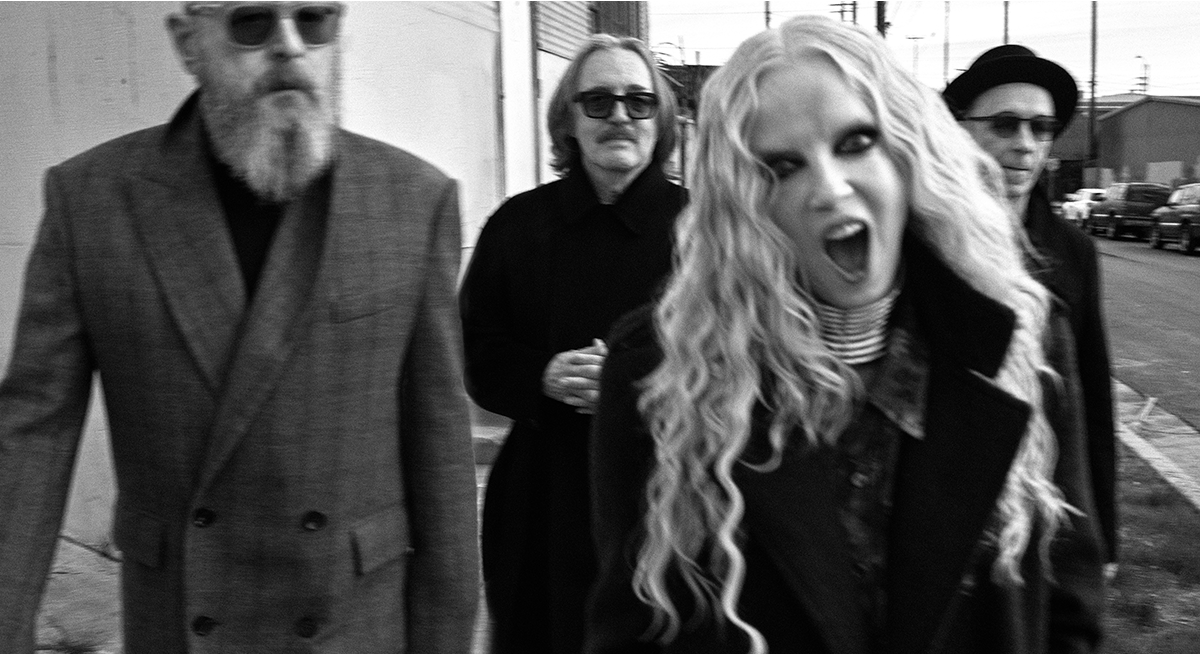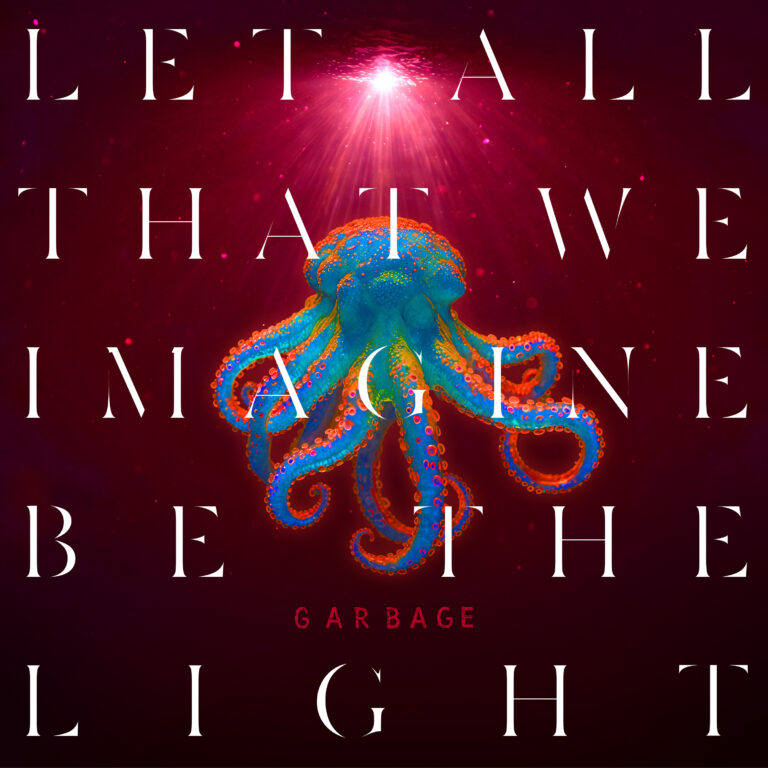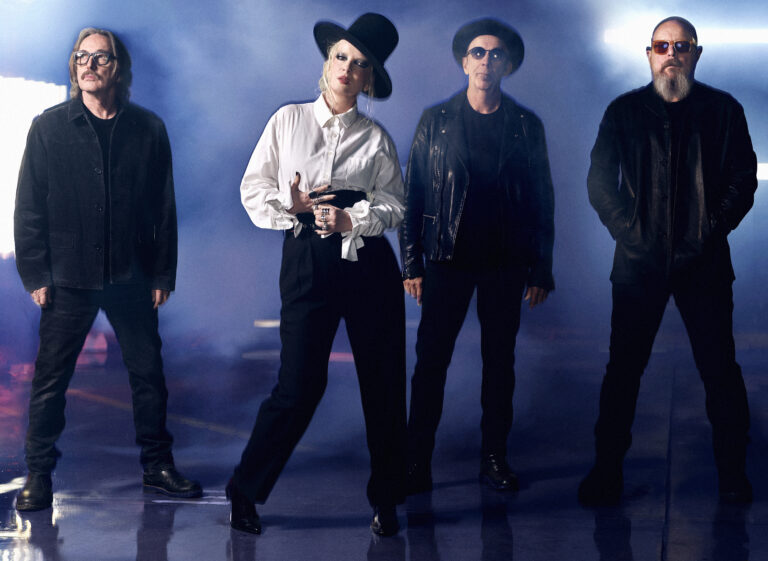
Let All That We Imagine Be the Light: Garbage’s Spellbinding Rally Cry
The much-anticipated eighth studio album from Garbage dropped today, led by the singles “There’s No Future in Optimism” and “Get Out My Face AKA Bad Kitty.”
’ve followed Garbage’s work for years, and one of the things I admire most is how each album feels like its own living, breathing thing. Let All That We Imagine Be the Light doesn’t repeat the past. It expands it. I don’t use a rating system because sometimes music just needs to sit with you as it is. This one sits heavy, bright, sharp, and needed.
This album reminds me of being a teenager dancing around my room with Garbage blasting. Except now, I’m almost 40, and this record meets me exactly where I am. It’s rare to grow with a band and still feel seen, still feel challenged, and still feel moved. What a gift it is to receive something like this after 30 years of Garbage. A body of work that doesn’t just look back, but looks forward.
In many ways, this feels like a spiritual sibling to No Gods No Masters. If that album was the rupture, this one is the burn and the balm. The flicker that refuses to go out. Yes, some lyrics might sound bleak in isolation, but taken as a whole, the album is a rally cry. It’s a reminder to fight. Fight for yourself, for others, for something better. It burns through despair and dares to offer comfort anyway.
There’s hope here. Not blind hope. Earned hope. Hope that sits in the ruins and still reaches for the light. This record hits on grief, rage, survival. But it never asks us to give up. It’s introspective and outward-facing. Political and personal. Sharp-edged and danceable. A full-bodied offering in hard times.

Of course, none of this exists in a vacuum. Duke Erikson, Steve Marker, and Butch Vig remain an undeniable force. Their musicianship across this album is nothing short of exquisite: layered, deliberate, and alive. Longtime collaborator Billy Bush also helps shape and sharpen the sound without ever dulling its edges. After three decades together, the band’s chemistry hasn’t faded. It has deepened, and you can feel it in every track. And Shirley Manson’s voice is as haunting as ever, in the best possible way. Not ghostly, but present. Her vocals get under your skin. Lines stay with you. They echo. They comfort. They demand something.
There is something alchemical about a lot of these songs. The repetition, the invocation-like lyrics, the tension between grief and power. It’s spellwork. Ritualistic. Witchy in spirit. This is an album you don’t just listen to. You feel it. Chant it. Carry it with you like a charm tucked under your sleeve.
Standouts like the searing opener “There’s No Future in Optimism,” the rallying “Chinese Fire Horse,” the hypnotic “Radical,” and the gorgeous closer “The Day That I Met God” all offer something uniquely vital. But really, the whole record moves as one layered, living piece.
For deeper reflections on each song, including the ones that made me dance, cry, or both, scroll below for a full track-by-track breakdown.

Track by Track: Let All That We Imagine Be the Light
“There’s No Future in Optimism”
This one had me from the first listen. It didn’t leave my rotation for a solid 45 minutes straight when it dropped. As the opener to the album, it sets the tone perfectly: disillusionment wrapped in defiance, bleakness balanced by movement. It’s not a surrender. It’s a dare.
The lyrics are heavy: “The night is dark and full of terror / The air is thick with helicopters.” Yet somehow, the track pulses with life. You’re thrown into the chaos, but instead of crumbling, you’re asked: Are you ready for love? Over and over, it’s repeated like a mantra, a plea, a challenge. That contrast between sirens and stars, collapse and connection, is exactly what makes this song (and the album) work so well. You can dance through the dread here, and it’s not escapism. It’s resistance.
“Chinese Fire Horse”
This is the one I can’t wait to scream along to in the car, in the shower, in a crowd. “Chinese Fire Horse” isn’t just a song. It’s a statement. It takes a blowtorch to ageism, especially the kind women face, and lights it up with all the fury and self-possession of someone who’s been underestimated for far too long.
Shirley doesn’t just push back. She roars. “Wait a minute, wait a fucking minute” becomes a rallying cry, a mantra, a full-body NO. The lyrics tear through every tired stereotype about aging, ambition, desirability, and power. And by the time she sings “I’ve still got the power in my brain and my body / I’ll take no shit from you,” it’s not just her voice. It’s all of ours.
This track is a thrill. Raw, rhythmic, unflinching. And for anyone who’s ever been told to sit down, fade away, or be quiet? It’s fuel.
“Hold”
This one crept up on me. On the first listen, I liked the drive, that steady pulse beneath it all. But it was the second time through that it landed. Now it’s lodged deep in my chest.
“Hold” feels like panic wrapped in a plea. It’s intimate and apocalyptic all at once. The world’s on fire, the monsters are real, and the only answer is to cling to someone with everything you have. There’s an aching vulnerability in Shirley’s delivery, especially when she sings “Hope don’t fail me / Your arms around me / Faith don’t shake me.” It’s like a whispered prayer with a tremble behind it.
By the end, it’s spinning: grief, fear, desperation, devotion. The lyrics stack and swirl until you feel breathless. “We keep running” repeats like survival itself is a loop. This song is a breakdown and a lifeline at once. And god, it hits hard.
“Have We Met (The Void)”
Goddamn, Garbage is so good at giving us a beat that goes hard and makes you feel like you’re spiraling through smoke. “Have We Met (The Void)” is one of the most atmospheric tracks on the album. It pulls you into its haze and then cuts you with a blade.
There’s something nightmarish and cinematic here. The lyrics slip between surreal, accusatory, and almost theatrical: a ghost at the door in white, a scream of betrayal, the sound of cathedral bells tolling as the floor drops out. It’s anxiety and paranoia on a loop, punctuated by that steady drive like a heartbeat speeding up under pressure.
“Have you motherfuckers been seein’ each other?” turns from a question into a curse, echoed and distorted as the void swallows everything. This one feels like being haunted. Not just by someone else, but by your own rage, heartbreak, and unraveling. You want to dance through it, but you’re also ducking for cover.
“Sisyphus”
This one got me, and it got me good. “Sisyphus” is that rare kind of song that meets you in the pit, then dares you to rise. It holds so much: angst, weariness, survival, and somehow still, hope. Not easy hope. Earned hope. A rally cry whispered from the bottom of the hill.
The lyrics are raw and aching: “Do I have the mind to do it all again? Do I have the will?” You feel that weight. But instead of sinking, the song starts to swell. There’s something deeply intimate and fiercely universal in the repetition of “this little body of mine is going to make things right.” It becomes a chant, a promise, a reclamation of power.
And those saint litany sections? Chills. It’s like a new mythology being written in real time. One that honors the broken, the grieving, the marginalized, and the furious. This track feels personal. Revolutionary. It might already be one of my favorite Garbage songs ever.
“Radical”
This one feels like being carried. A slow, hypnotic sway that wraps around you and pulls you under. I can’t sit still when “Radical” comes on. It’s a closed-eyes, move-like-water kind of track. The kind you feel in your chest before your brain fully catches the lyrics.
The line “Nothing good is ever easy to keep” grabbed me instantly. But it’s not the only one. This track is full of lines that dig in and stay with you. Grief and hope run side by side here. “Grief is love turned inside out” hit me like a whisper I already knew. The whole song walks that thin line between sorrow and defiance.
When Shirley sings “Let all that we imagine be the light,” it hits like a spell. That line, the one that gives the album its name, feels like both a prayer and a blueprint. This isn’t about empty optimism. It’s about reaching for the light on purpose, even when it hurts to believe in one.
“Radical” isn’t loud. It doesn’t shout. But it hums with power. One of the most quietly potent tracks on the record.
“Love to Give”
I don’t even know what to say about this one. I just know I can’t sit still. The verses make me do my little witchy dances without even realizing it, and the chorus? Pure serotonin. It bops, it slaps, it spins. And those drummmmms are doing the most in the best possible way.
But it’s not just about the beat. “Love to Give” is sneaky-deep. It’s tender and heavy and strangely affirming. Like someone dancing their heart out while crying in the kitchen. “This is a cold, cruel world… you gotta find the love where you can get it.” That hits. So does “I feel so much that I feel nothing.” There’s so much honesty in these lyrics. Messy, human truth wrapped in rhythm.
The way Shirley delivers “I’ve got a lot of love to give” isn’t desperate. It’s knowing. Clear-eyed and worn-in. It’s love that’s been tested. This track is joy and grit. It makes me want to dance through every kind of grief and still come out offering something.
“Get Out My Face AKA Bad Kitty”
Started dancing in under 20 seconds. No notes. This is the track I already know I’ll come back to when I need to scream-sing my heart out and just move. Full-body release. This is the purge song. The stomp-it-out, blast-it-loud, shake-it-off-and-claim-your-space song.
There’s something so satisfying about how direct it is. The repetition, the clipped phrasing, the “get out” command pulsing like a beat of its own. Shirley’s delivery is part snarl, part smirk, part spell. And the lyrics? Brutal honesty wrapped in rhythm. “You hold the power, but we hold the feeling.” That’s a punchline and a battle cry.
This track has attitude for days. But underneath the sass is something deeper: survival. This isn’t just a fuck-you. It’s a we’re still here. It’s exhausted and elated and powerful as hell.
“R U Happy Now”
I don’t even know where to start with this one. It wrecked me a little. Sonically, it rips. I can blast this and head-nod and move with it, but underneath, the lyrics are hitting something raw. “R U Happy Now” is pure confrontation. Sharp, unflinching, and done pretending to be polite.
It tears into modern hypocrisy and cruelty without blinking. “They kill books, they break rules, they kill dreams” gutted me. It’s a song that feels like someone finally saying the quiet part out loud and daring you to sit with it. If you’ve been angry, tired, or just fed up, this one doesn’t ask you to soften it. It meets you there.
“The Day That I Met God”
Brutally beautiful. That’s the only way I can start to describe this one. Shirley’s voice absolutely shines here. Not just in tone, but in presence. There’s a gentleness in her delivery that feels almost weightless. I float in this song. It’s haunting, not because it’s eerie, but because it lingers somewhere just outside of language.
The music itself is stunning. Probably one of the most beautiful compositions on the album. There’s a sense of openness, like the track is holding space for something holy and cracked and fully human. The chorus is tender and cosmic all at once. “It was everyone I’d ever loved / And I didn’t say a word.” That kind of line just sits in your chest.
And the outro? Epic. It closes the album in this expansive, otherworldly way. Like being lifted out of your own body, watching the pieces fall, and not needing to fix anything. Just witnessing. It’s a standout in every sense, and the perfect final breath of this record.
